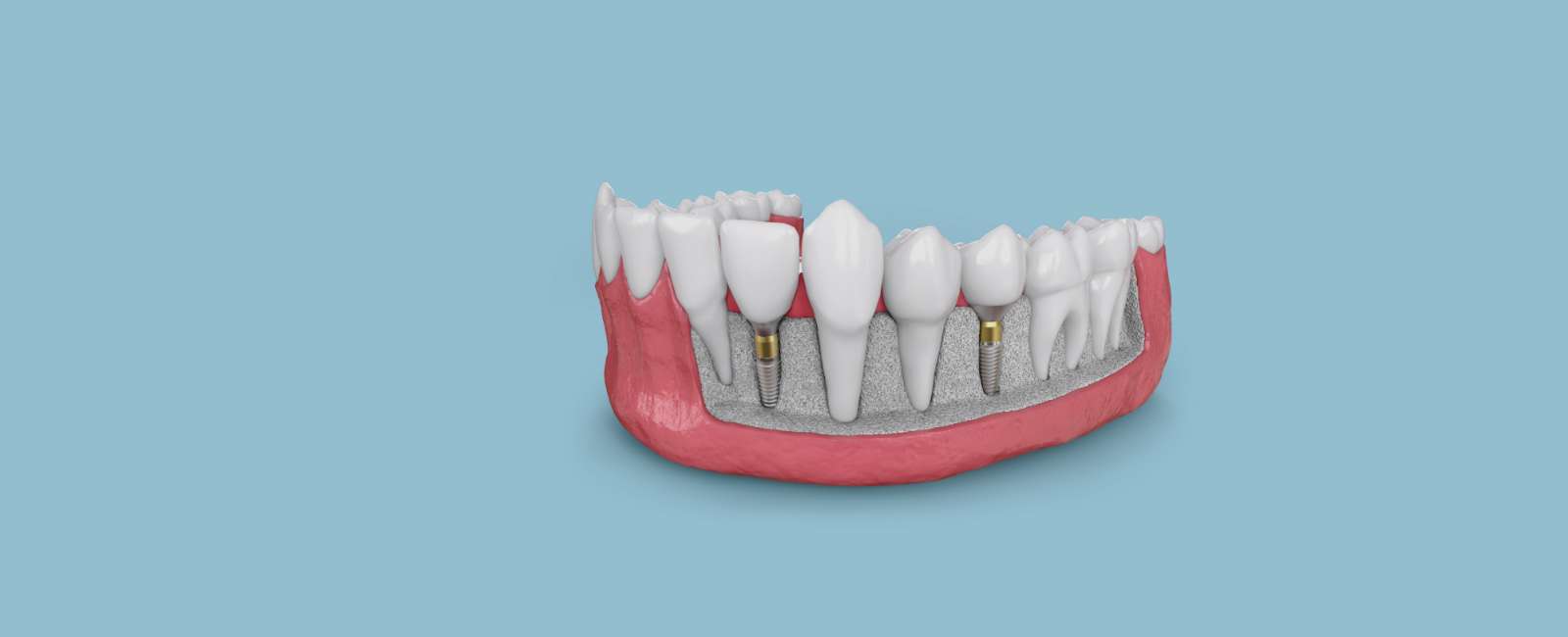Dental Implants in Los Angeles

A complete and healthy smile can prove to be one of your most confidence-enhancing features. Missing teeth can impact your self-esteem, how you interact socially and professionally, and even your ability to eat comfortably. Dental implants restore both function and appearance, helping you regain confidence and smile with pride.
Table of Contents
- What Are Dental Implants?
- Who Is a Good Candidate for Dental Implants?
- Types of Dental Implants
- What Do You Desire?
- What Happens During the Dental Implant Procedure?
- Recovery and Aftercare
- Dental Implant Costs and Insurance
- Frequently Asked Questions

What Are Dental Implants?
Dental implants are a long-term solution for replacing missing teeth. A titanium post is surgically placed into the jawbone, where it integrates with the bone to support a crown or bridge. Designed to look and function like natural teeth, implants offer stability, durability, and help preserve jawbone health by preventing bone loss.
Who Is a Good Candidate for Dental Implants?
A good candidate for dental implants is someone in good overall health who is missing one or more teeth. Ideal candidates for dental implants should also have:
- Sufficient jawbone volume/density to support the implant
- Healthy gum tissue
- Good oral hygiene
Patients with certain medical conditions, such as diabetes or severe osteoporosis, may need to take special precautions or have additional testing before undergoing dental implant surgery. The best way to determine if you are a good candidate for dental implants is to schedule a consultation with Dr. Salamati. He will perform an examination, listen to your concerns, and create a customized treatment plan tailored to your dental implant needs.

Types of Dental Implants
Dental implants are an excellent solution for replacing missing teeth, providing a permanent and natural-looking alternative to traditional dentures or bridges. There are several types of dental implants available to address different needs:
- Single Tooth Implants: Ideal for replacing one missing tooth, providing a natural look and feel.
- Multiple Dental Implants: Designed to replace multiple missing teeth, offering a stable and long-lasting solution.
- Full Mouth Dental Implants: Perfect for individuals who need to replace an entire section of missing teeth, restoring both functionality and aesthetics.
- Implant-Supported Dentures: These implants provide a secure fit for full dentures, enhancing comfort and stability.
- Same-Day Dental Implants: For those seeking immediate results, this option allows for the placement of functioning implants without the traditional waiting period.
Each type of dental implant is customized to meet your specific needs, ensuring that every patient can find a solution that works best for them.
What Do You Desire?
A Natural-Looking Smile
Dental implants both look and feel like your natural teeth, preventing future bone loss and gum recession while creating a natural-looking smile. The only people who will know you had dental implants are those you choose to tell. Dental implant treatment is tailored to each patient, ensuring a beautiful, long-lasting smile.
Adjacent Tooth Protection
Unlike traditional bridges, dental implant procedures are designed to protect adjacent teeth without causing harm. Bridges require neighboring teeth to be filed/drilled down to support the bridge. This can create additional problems down the line as bones may deteriorate, gums may recede, and the supporting teeth may decay. Since implants are inserted directly into the gum and bone, there is no need for adjacent teeth to be used as anchors.
Peace of Mind
Fixed bridges or dentures may deteriorate over time, causing you to be cautious about eating certain foods. Dental implants allow you to eat anything you want without fear. Implants are secure, reliable, and, when properly maintained, can last a lifetime.
Increased Confidence
Missing or damaged teeth can make you feel self-conscious in both your business and personal life. Dental implants can restore your confidence in your teeth, allowing you to smile, speak, and eat without anxiety.

What Happens During the Dental Implant Procedure?
There are several steps involved in dental implants.
Initial Consultation
Your dental implant journey begins with a consultation with Dr. Salamati. During your initial visit, Dr. Salamati will assess your oral health to determine if dental implants are right for you. This includes a full dental exam and imaging to evaluate your jawbone and the area of tooth loss. After reviewing the results, Dr. Salamati will discuss your options and recommend a personalized treatment plan.
Getting Ready for Implant Surgery
If you’re a good candidate for implants, there may still be a few preliminary steps needed before moving forward. For instance, if the dental implant is replacing a damaged tooth, the damaged tooth must be extracted first.
In cases where teeth have been missing for some time, bone loss may have occurred in the jaw. Studies indicate that up to 25% of bone volume in the jaw can be lost within a year of tooth loss. To build up your jawbone to ensure it can support the future implant, bone grafting might be necessary.
Placing the Dental Implant
The heart of the dental implant procedure is the placement of a titanium post into your jawbone, which acts as the new root for your artificial tooth. This outpatient surgery is done using local anesthesia and/or sedation for a smooth and comfortable experience. You won’t feel pain during the process—just some pressure or vibrations.
Following the implant placement, a healing period of a few months is needed. This stage, known as osseointegration, allows the implant to naturally fuse with your jawbone, creating a secure, stable foundation for your artificial tooth. Some swelling or minor discomfort is common during the first few days, but this can usually be controlled with over-the-counter medication and proper aftercare.
Attaching the Abutment and Crown
Once the implant has successfully bonded with the jawbone, the next phase involves adding an abutment—a small connector that links the implant to the final crown. A custom crown, designed to match the color of your natural teeth, is then securely placed on top of the abutment.
This final step is quick and minimally invasive, with little to no discomfort.
Recovery and Aftercare
Healing after a dental implant procedure varies from person to person, but most patients are able to return to their daily routines shortly after treatment. The recovery process is generally divided into three main stages, depending on the specific steps involved in your dental implant journey.
Stage 1: Healing After Preparatory Procedures
You may require preparatory treatments such as tooth extraction or bone grafts before an implant can be placed. Recovery from these treatments can take several weeks to a few months, and you must be completely healed before the implant can be placed. However, not all patients need this step, and the exact timeline will depend on the complexity of the treatment and your body’s healing response.
Stage 2: Healing After Implant Placement
After the implant post is surgically placed into your jaw, the body begins osseointegration, where the bone gradually bonds with the implant. This critical step usually takes a few months. A temporary crown may be used during this period for cosmetic or functional purposes.
It’s normal to feel mild discomfort and experience some swelling or slight bleeding after surgery, but these symptoms usually resolve within a few days.
Stage 3: Recovery After Crown, Bridge, or Denture Placement
Once the implant fully integrates, your dentist will attach the final crown, bridge, or denture—usually with little to no recovery time. Some patients may experience minor soreness or swelling, especially when multiple teeth are replaced, but these effects are typically short-lived and manageable with over-the-counter or prescribed medication.
During the healing stages, it’s common to notice mild discomfort, swelling, or bruising. To ease symptoms, follow a soft food diet, take pain relievers as directed, and attend all follow-up appointments. Maintaining good oral hygiene is crucial to prevent infection and support healing. Gently brush and floss your teeth, and follow Dr. Salamati’s personalized aftercare instructions to help ensure your implant’s long-term success.

Dental Implant Costs and Insurance
Dental implant costs vary depending on the implant type, placement location, and your dentist’s fees. A single implant typically ranges from $2,000 to $5,000, while full-mouth implants can cost $20,000 to $50,000 or more. Dr. Salamati will provide you with an accurate cost estimate during your consultation.
Although dental implants are typically considered an elective procedure, some insurance plans may cover part of the cost. It’s essential to verify your insurance coverage with your provider to determine the extent of your benefits. Additionally, Dr. Salamati offers financing options to help make dental implants more affordable, ensuring that you can achieve a healthy, beautiful smile without financial strain.
Frequently Asked Questions about Dental implants in Los Angeles
When can I return to work after tooth implant surgery?
You may resume working the following day of your dental implant procedure if you feel comfortable doing so. You may experience some minor side effects like discomfort or swelling, but if you feel these are manageable, you can return to work immediately. As everyone is different, it is best to consult with Dr. Salamati before resuming your daily routine.
How long does dental implant surgery take?
The duration of the surgical phase of a dental implant procedure varies depending on several factors, including the number of implants placed and the complexity of the procedure. A typical dental implant session usually takes around thirty minutes to two hours.
Will I have to go without a tooth while I wait for the implant to fuse with my jawbone?
After the implant is placed, a temporary tooth may be worn over the implant until the final crown is attached.
Are dental implants painful?
We use local anesthesia during the procedure and offer nitrous oxide, conscious sedation, or general anesthesia if needed. Afterward, you may experience mild discomfort, including gum bruising, slight pain at the implant site, or minor bleeding. This pain is manageable and can be handled with pain medication.
What if my bone has deteriorated?
Adequate bone in your jaw is needed to support the implant, but if you have bone loss, dental implants may still be an option. Bone grafting procedures can repair the jawbone by using bone from a tissue bank, your own bone or a combination.
Will my implants be completed within six months?
While traditional dental implants take three to six months to complete, you may be a candidate to get your teeth the same day with a procedure that provides functioning implants without the wait.
How should I care for my implants?
Dental implants should be treated the same as your natural teeth. Consistent brushing, flossing, and dental cleaning (periodontal maintenance) will help to maintain your smile.
What should I eat after getting dental implants surgery?
After dental implant surgery, eat soft foods such as yogurt, mashed potatoes, applesauce, smoothies (no straw), and scrambled eggs. Avoid hot, spicy, crunchy, or chewy foods for a few days. You can gradually reintroduce firmer foods as you heal.
